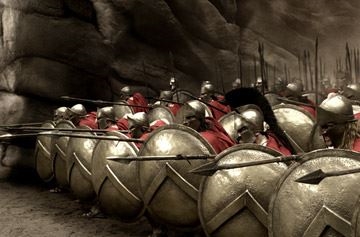With blood running from his body and sweat flowing rivulets down his face, one thought hammered through his brain, “Defend Sparta.” In the year 480 B.C. a massive Persian army descended upon the unwary Greek state seeking to enslave the population, expand their empire, and extinguish the notion of democracy that had sprung up among the Greeks. Leonidas with his 300 warriors faced down the hundreds of thousands of Persian slave-soldiers driven onward by whips. Although faced with inevitable death, Leonidas bravely stood against the Persian invaders to defend his country and citizens. Even today, in the 21st century, his legendary deed still influences us. Without a doubt, Leonidas is worthy to be called a hero for his willingness to sacrifice his life in the struggle against evil, for defending the buds of democracy against the wrath of tyranny, and for protecting his people from bitter oppression and slavery.
 |
| Spartan's last stand at Thermopylae (http://movies.yahoo.com/movie/1809262865/photo/stills) |
The legend of Leonidas was over two millennia ago, and thus not much is known about his life prior to the famous battle of Thermopylae. He was born in 530 B.C. as the youngest son of king Anaxandrides. As a Spartan boy he began rigorous military training from the age of six. As Leonidas came to rule, the sparks of the second Persian-Greco war had already burst into flames. King Xerxes “spent more than four years gathering soldiers and stockpiling supplies from every corner of his empire. The resulting host amounted to a colossal cosmopolitan army of armies…Greek historian Herodotus estimated at 1.7 million, excluding the navy.” ( Frye ) When the Persians struck, a Greek army could not have been mobilized due to the sacred festivals. With his limited resources, Leonidas held off the Persians at the Pass of Thermopylae. “[It] ran west to east, mountains rose sharply to the left or southern side, and the Aegean Sea washed the right or northern sides…his disposition was well-chosen, for the Persian army would have to disrupt their formation to enter the mouth of the pass.” ("Leonidas, I, King of Sparta (c. 530 B.C.-480 B.C.)." ) However it was not perfect. “Leonidas seems to have learned about the ‘Achilles heel’ of Thermopylae only after arriving in the pass. A circuitous mountain route existed, known as the Anapaea Path, by which an enterprising army might enter in the rear of Thermopylae, trapping the defenders inside.” ("Leonidas I.") Regretfully a treacherous Greek named Ephialtes directed the Persians through the pass for a handsome reward, thus leading to the defeat of Leonidas and his men.
In that narrow passage, Leonidas did what seemed to be the impossible. With his measly contingent of warriors, he forfeited his life and successfully delayed the Persian invaders. When the tidings of invasion reached Leonidas from a Persian messenger who demanded Sparta's surrender, he quickly assembled an expeditionary force to impede the Persians until the Greek armies could be mobilized. For this purpose "Leonidas selected 300 citizen warriors, a customary number when embarking on a special mission, but he only chose among the best who had sons so that no family line would become extinct through the death of the father." ("Leonidas I.") He knew with only the pitiful amount of 300 soldiers, there was no hope to bring to a halt the behemoth that was the Persian army. He even perceived that he would fall in battle, but nonetheless he displayed an act of Herculean bravery and took up arms against the oncoming calamity. Towards the last moments of their valiant resistance, "[T]he Greeks, knowing that their own death was coming to them from the men who had circled the mountain, put forth their very utmost strength against the barbarians; they fought in a frenzy, with no regard to their lives." ("Leonidas, I, King of Sparta (c. 530 B.C.-480 B.C.).") Their courage and heroism paved the way as a rallying cry against the Persians in the final struggle. Without them, Greek would have fallen to its invaders.
For his people and kingdom, Leonidas made the ultimate sacrifice so that they could enjoy freedom and never have to kneel to another man. Those who were conquered by the Persians were faced with slavery and taxes to appease the emperor. None could escape their fate of being chained and labor for their conquerors. Leonidas did not want this fate for his countrymen and fought to the death against the waves of Persian invaders. For him, Greek's independence was much more significant than his own life. " Leonidas was a great example of how Spartan kings should act. He fought with his soldiers to boost morale and gain loyalty in each of them. He also kept the Spartans free from the hands of the powerful Persians." (Stewart) To defend Sparta he laid down his life in service. His compassion for his people is truly the mark of a hero.
Though Leonidas himself may not have realized it at the time, his actions forever changed the course of history. Greece, being the home of great classical philosophers was the birthplace of democracy. The idea of a government based on freedom and equality that we even use today descended from the Greeks. On the other hand Persia was ruled by an emperor who dictated by his will alone of all the decisions that went on in the empire. The battle at Thermopylae ensured that democracy would triumph over tyranny. It was an event that will be eternally remembered as a turning point in the history of humanity. In hindsight, Leonidas is truly a hero for his brilliant battle against the Persians and defending his land from the clutches of dictatorship. Had Leonidas not fought tooth and claw at the Thermopylae, the world would have been a very different place today.
Page created on 5/21/2010 12:00:00 AM
Last edited 5/21/2010 12:00:00 AM
